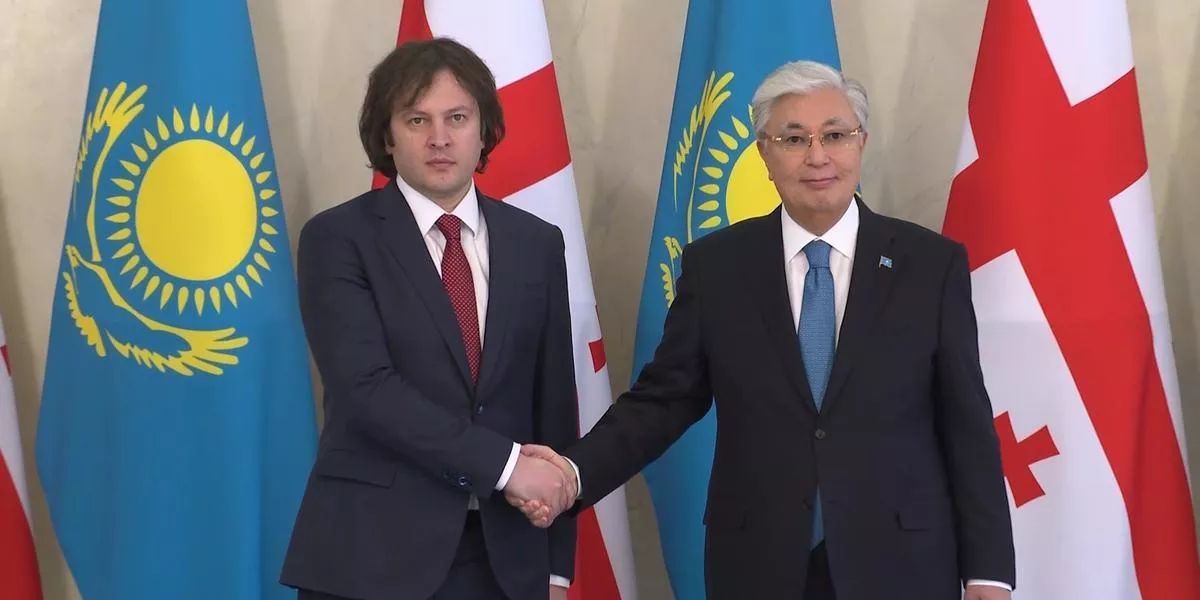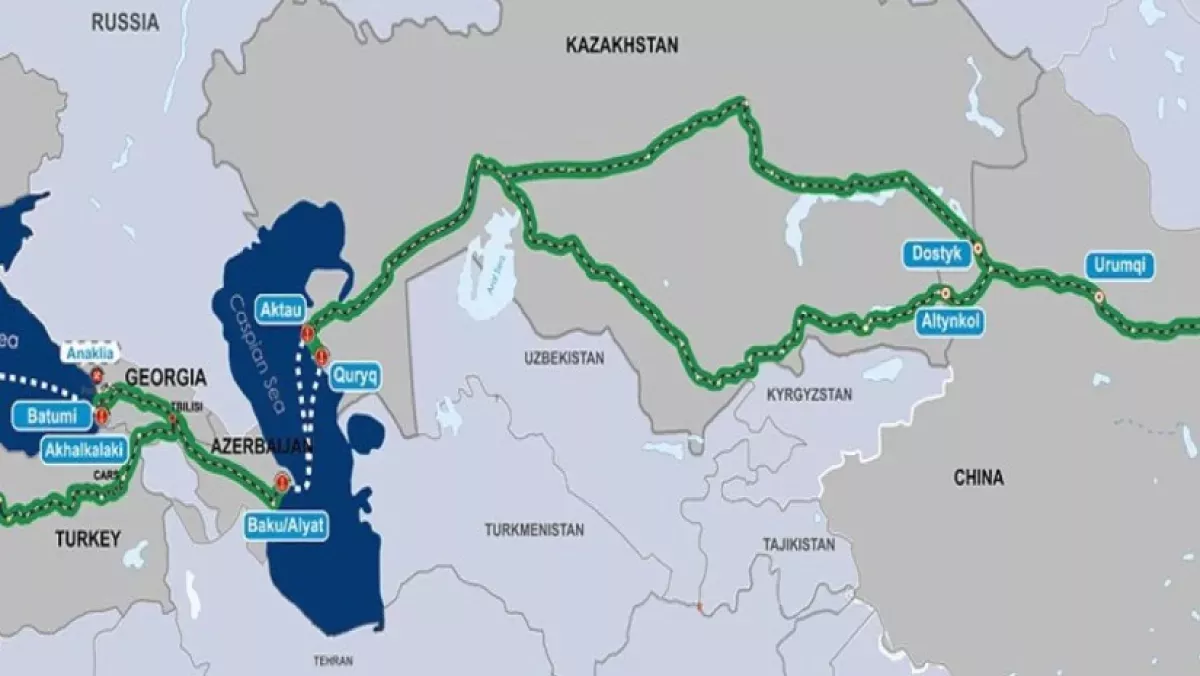Kazakhstan, Georgia, and the Middle Corridor Partnership amid geopolitical challenges
The visit of Georgian Prime Minister Irakli Kobakhidze to Kazakhstan on February 6 once again underscored the geopolitical significance of the Middle Corridor and the stability of all the countries it traverses. During the visit, plans were discussed to at least double the Middle Corridor’s capacity over the next two years. This is in the interest of both Georgia, as a transit country, and Kazakhstan, which requires a strategically vital transit “window” to the West to strengthen its state sovereignty.
Georgia recently experienced an externally inspired attempt at destabilisation linked to the parliamentary elections. The pro-Western "Maidan" in Georgia posed a significant geopolitical risk not only for the country itself but also for Central Asian states. For Kazakhstan, such a scenario could have disrupted transit along the Middle Corridor. Fortunately, Georgia maintained its sovereignty and stability.
It is symbolic that as soon as the situation in the country stabilised and the government strengthened its position, the head of government made an official visit to Kazakhstan. "The development of bilateral cooperation with Kazakhstan is of particular importance for our country, so it is no surprise that one of the first official visits after the parliamentary elections is to Kazakhstan," Georgian Prime Minister Irakli Kobakhidze told Georgian journalists in Kazakhstan.
Despite claims by the pro-Western Georgian opposition about the alleged "international isolation" of the Georgian Dream government, Kazakh President Kassym-Jomart Tokayev made it clear that he fully recognises the legitimacy of Georgia’s current leadership. He also emphasised that Georgia’s stability and dynamic economic development are in Kazakhstan’s interests as well.
President Tokayev congratulated Irakli Kobakhidze on his reappointment as prime minister and noted that Georgia is a very important partner for Astana.
"I congratulate you on your reappointment as Prime Minister of Georgia. Georgia is a very important partner for Kazakhstan, and your well-deserved appointment reflects your strong leadership in your country. I wish you success.
Additionally, I would like to take this opportunity to highly appreciate the significant progress Georgia has achieved in recent years. We are closely following your country’s economic development. As far as I know, last year’s economic growth reached 9.4%, which is quite an impressive result.
Georgia is a friendly country to Kazakhstan. We have the opportunity to witness this economic growth, which will undoubtedly benefit our bilateral cooperation. Your visit to Kazakhstan is very important. I am confident that it will contribute to further cooperation and the strengthening of our relations in many strategically significant areas," said the President of Kazakhstan.

To recall, during the plenary session of the St. Petersburg International Economic Forum in the summer of 2022, Tokayev, in the presence of Russian President Vladimir Putin, explicitly stated that Kazakhstan does not recognise quasi-states such as the so-called "South Ossetia" and Abkhazia. In other words, the Kazakh leader firmly supports Georgia’s territorial integrity.
In Astana, the prime ministers of Kazakhstan and Georgia, Olzhas Bektenov and Irakli Kobakhidze, agreed to increase cargo transportation along the Middle Corridor via the Trans-Caspian International Transport Route (TITR). This route, which bypasses Russia, has been developing rapidly since the start of the Russia-Ukraine war and the imposition of international sanctions against Russia, as confirmed by freight turnover statistics. While in 2022, cargo volumes along this corridor amounted to 1.5 million tonnes, by the end of 2024, they had risen to 4.5 million tonnes.
Kazakh companies are actively involved in expanding transit capacities in Georgia. In 2025, a new joint multimodal terminal, constructed by a Kazakh transport and logistics investment group, is set to be launched at the Georgian port of Poti. The ongoing efforts to develop transit infrastructure are expected to more than double the Middle Corridor’s capacity to 10 million tonnes per year by 2027.
Kazakhstan still relies on transit through Russia, with which it shares the longest land border and an extensive network of cross-border railway connections. For now, Kazakhstan’s primary Black Sea export hub is not the Georgian ports of Poti or Batumi but the Russian port of Novorossiysk.
Interestingly, Kazakhstan encountered transit issues for a range of goods through Russia—particularly via Novorossiysk—just as protests linked to the parliamentary elections and the opposition’s failed attempt to stage a "Maidan" unfolded in Georgia. The Russian agricultural watchdog, Rosselkhoznadzor, played a key role in complicating conditions for the transit of Kazakh agricultural products.
It is no secret that Rosselkhoznadzor, like Rospotrebnadzor (agency for consumer rights), has long been used by the Russian authorities as a tool for political pressure on economic partners. The fact that Rospotrebnadzor raised concerns over a range of Kazakh transit goods late last year had already caused alarm in Astana.
In the autumn of 2024, Kazakh exporters began facing significant financial losses due to phytosanitary restrictions imposed by Rosselkhoznadzor on certain products transiting through Russia. They were forced to return shipments and pay hefty fines for failing to meet contractual deadlines.
At the end of October 2024, the Russian agency alleged the existence of so-called "fraudulent schemes" used by the Kazakh side in transporting agricultural products across the border. Rosselkhoznadzor specifically claimed that Kazakhstan had been using "invalid product certificates" for several years.
The situation escalated to the point where Kazakh MPs from the Amanat and Respublika parties proposed, in response to Russian measures against Kazakh transit, to limit the import of Russian products into Kazakhstan and even initiate proceedings in the Court of the Eurasian Economic Union (EAEU). In an official parliamentary request addressed to Prime Minister Olzhas Bektenov, it was reported that the transit restrictions were causing delays in product deliveries, train standstills at Russian stations, and, as a result, violations of contractual obligations. Due to the actions of Rosselkhoznadzor, transit flows were effectively paralysed, and Kazakh warehouses became overloaded with products that had a limited shelf life.
One example cited was the situation with four Kazakh export companies that had sent a batch of lentils to the port of Novorossiysk for further transportation to Türkiye. However, the shipment was delayed because, the day after 16,000 tonnes of lentils were loaded onto the vessel, Rosselkhoznadzor announced the presence of "quarantine objects," which created serious risks for the completion of the deal.
"The goods were accompanied by a Kazakh phytosanitary certificate, and Rosselkhoznadzor had no issues during transit across the entire territory. The loading took place directly onto the vessel, bypassing the storage facilities of PJSC Novorossiysk Commercial Sea Port. The total value of this shipment exceeded $10 million. This situation highlights the high risks faced by Kazakh exporters, who encounter unpredictable and unjustified obstacles from Russian regulatory authorities," the parliamentary request states.
The request also pointed out that Rosselkhoznadzor is directly violating the norms of the EAEU agreement, particularly the fundamental principles of the free movement of goods and transit between member states. According to the MPs, to address the issue, alternative logistics routes for the export of Kazakh products should be developed, and subsidies for the transportation of goods along these routes should be introduced.

The Middle Corridor, with the option to transit via the Caspian Sea, Azerbaijan, and Georgia, has become an alternative logistics solution for Kazakhstan in the event of difficulties with transit through Russia. Georgian ports like Poti and Batumi could serve as viable alternatives to Novorossiysk, and, in the long run, the deep-water port of Anaklia, which is being built with the help of Kazakhstan and Georgia’s economic partner, China, could play an increasingly significant role.
When it comes to oil products, the importance of transit through Georgia for Kazakhstan has been growing rapidly. In 2024, Kazakh producers reduced their exports of fuel oil through Russia by about a quarter, redirecting shipments through the Trans-Caspian International Transport Route via the Kuryk port on the Caspian Sea, Azerbaijan, and the Georgian port of Batumi, which is managed by the KazMunayGas subsidiary, KazTransOil JSC.
With the Middle Corridor and Georgian ports as alternatives, Kazakhstan can more effectively defend its economic interests, and the ability of others to "twist Kazakhstan’s arm" using transit leverage is diminishing.
On the contrary, had the situation in Georgia been destabilized through "Maidans and revolutions" and the Middle Corridor had been blocked, pressure on Kazakhstan regarding transit issues could have intensified. The fact that Rosselkhoznadzor increased its pressure on Kazakh transit almost simultaneously with the beginning of the "Maidan-style" attacks from Georgia’s pro-Western opposition on the Georgian government seems to be more than just a coincidence.
The "Maidan" in Tbilisi was being attempted under anti-Russian slogans. While it was clear that destabilization in Georgia, especially the opening of a "second front" against Russia if the pro-Western opposition succeeded, would block the Middle Corridor. This, in turn, would give Russia significantly more leverage to dictate terms to Kazakhstan and Central Asian countries as the "only" viable transit route. It turns out that the "anti-Russian" factions within Georgia's opposition, led by Zourabichvili, were effectively helping Russia strengthen its economic influence over Kazakhstan and Central Asia. However, with the development of transit via the Middle Corridor as an alternative to Russian transit, the possibilities for geopolitical pressure on Kazakhstan to limit its sovereignty are diminishing.
Vladimir Tskhvediani, Georgia, for Caliber.Az








